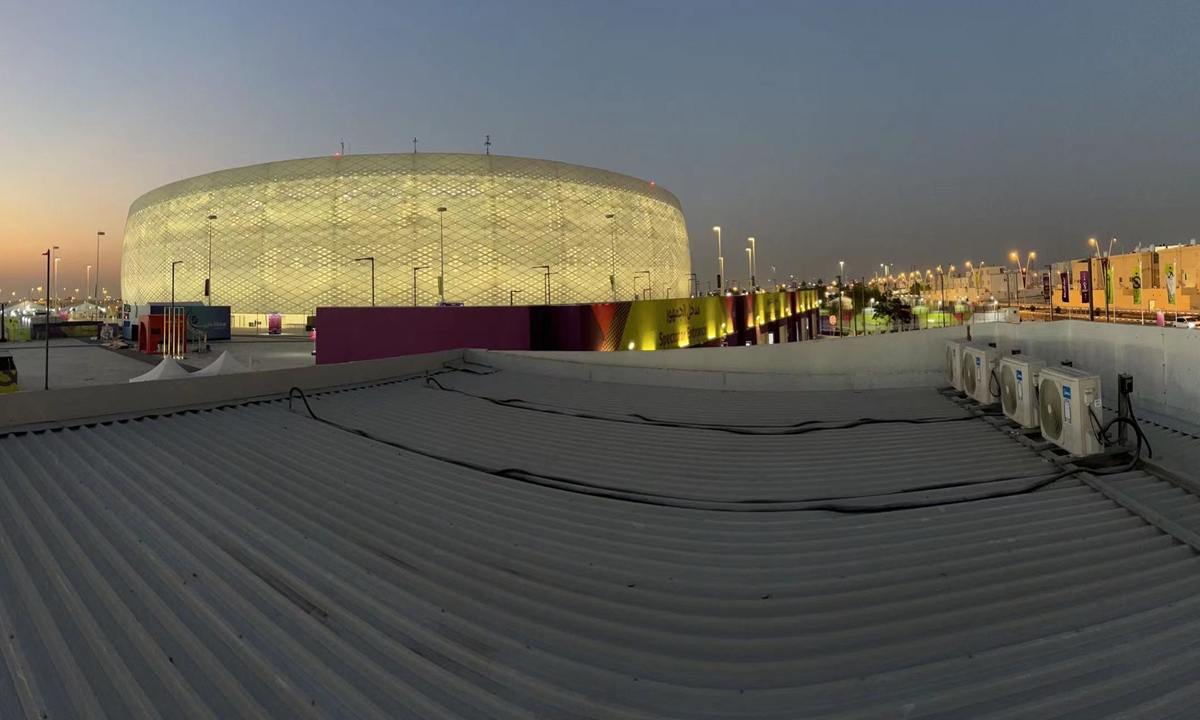
Mascots of previous World Cups are seen during the opening ceremony before the Group A match between Qatar and Ecuador at the 2022 FIFA World Cup at Al Bayt Stadium in Al Khor, Qatar, on Nov. 20, 2022. (Xinhua/Lan Hongguang)
The Qatar 2022 FIFA World Cup is driving up China's home appliance exports to the Middle East, with color TVs, air conditioners and projectors among the most popular goods, and Middle Eastern and African markets along the Belt and Road Initiative (BRI) route are becoming hot targets for Chinese appliance firms, industry data showed.
In the first 10 months of 2022, China's exports of home appliances to the League of Arab States, including Qatar, rose by 11.21 percent on a yearly basis, while exports of color TVs alone increased by 29 percent year-on-year, according to data from the China Chamber of Commerce for Import and Export of Machinery and Electronic Products.
The World Cup also gave a boost to cross-border e-commerce. According to AliExpress, the global retail online marketplace under Alibaba Group, sales of China-made foosball tables in the United Arab Emirates (UAE) surged 120 percent and that of couches jumped 800 percent year-on-year over the past month. Meanwhile, sales of Chinese projectors on the platform in the Middle East in October rose 120 percent year-on-year.
Liang Zhenpeng, a senior industry analyst, attributed the rapid sales growth in the Middle East to local residents' demand for watching the World Cup but more importantly, the increasingly high-end brand image of Chinese home appliance makers on the back of their technological innovation and improved after-sales services.
"The trend will likely continue even after the World Cup, as Chinese home appliance brands already have the capacity and confidence to join in the global competition," Liang old the Global Times on Thursday.

Photo: Courtesy of Midea Group
In addition to 2,500 Midea air conditioners, which were installed at 100 security check centers of the World Cup competition venues, electrical appliance manufacturing giant Midea Group has customized anti-corrosion multi-split units, cabinet units and roof units for the World Cup, the company told the Global Times.
The Middle East and Africa are not fully mature markets, but their economies are still growing steadily and given the high local temperatures, air conditioners are necessary, so the market opportunities are still good, Dennis Lee, general manager of Midea Building Technologies Oversea Sales Company MEA Region, said in an online interview on Wednesday.
"We are also actively looking for localized manufacturing opportunities in the Middle East to provide faster delivery solutions," said Lee, noting that it is the right time to explore markets in Saudi Arabia, the UAE and Qatar as various local projects are restarting.
Chinese home appliance brands are also actively carrying out marketing during the World Cup to increase their brand recognition in the international market. Apart from Hisense Group, which is an official sponsor of the 2022 World Cup, and Chinese leading smartphone brand Vivo, the official smartphone sponsor, some other Chinese home appliance brands such as TCL have reached collaboration deals with well-known national football teams for promotions during the World Cup.
TCL told the Global Times on Thursday that since entering the Middle Eastern and African markets in 2004, its business now covers the six Gulf countries in the region, and it has gained a roughly 26-percent market share in Qatar, 10 percent in Saudi Arabia and about 9 percent in the UAE.
According to industry insiders and analysts, economic transformations in BRI countries and regions, including Saudi Arabia, the UAE and Qatar, provide new opportunities for Chinese home appliance companies.
Targeting the Middle Eastern and African markets, Chinese companies are rushing to establish factories in countries such as Egypt, South Africa and Nigeria, contributing to local economic and social development.
For instance, Midea's Building Technologies is developing the central air-conditioning business of self-owned brands Midea and Clivet, with self-owned brands accounting for 80 percent of the total, and the products mainly coming from Midea's bases in China, Italy and Egypt.
The Hisense SA Industrial Park, jointly launched by the China-Africa Development Fund and Hisense in South Africa in 2013, has an annual production capacity of 540,000 refrigerators and 390,000 TVs. In 2021, the facility directly created 3,000 jobs and trained more than 8,000 skilled workers, contributing greatly to manufacturing capacity in South Africa, BRI news portal Xinhua Silk Road reported.
Amid international changes, TCL is diversifying its manufacturing facilities overseas. "Chinese companies should shift to exporting industrial capability from exporting products, and drive up exports of domestic materials, components and equipment. They should enhance their capability for global operations by investing in global industrial chains and breaking trade barriers," said TCL Corp Chairman Li Dongsheng.
Just on Wednesday, the first home appliance-carrying China-Europe freight train from Xi'an, Northeast China's Shaanxi Province departed, fully loaded with refrigerators and washing machines, headed to Europe, underscoring the popularity of Chinese home appliances globally.
Chinese home appliance brands' overall advantage in research and development, industrial chains and manufacturing as well as the spillover industrial capacity overseas means stronger international competitiveness, Liang said, noting that it's a good opportunity for these brands to achieve a leap in development in the post-COVID-19 era.





